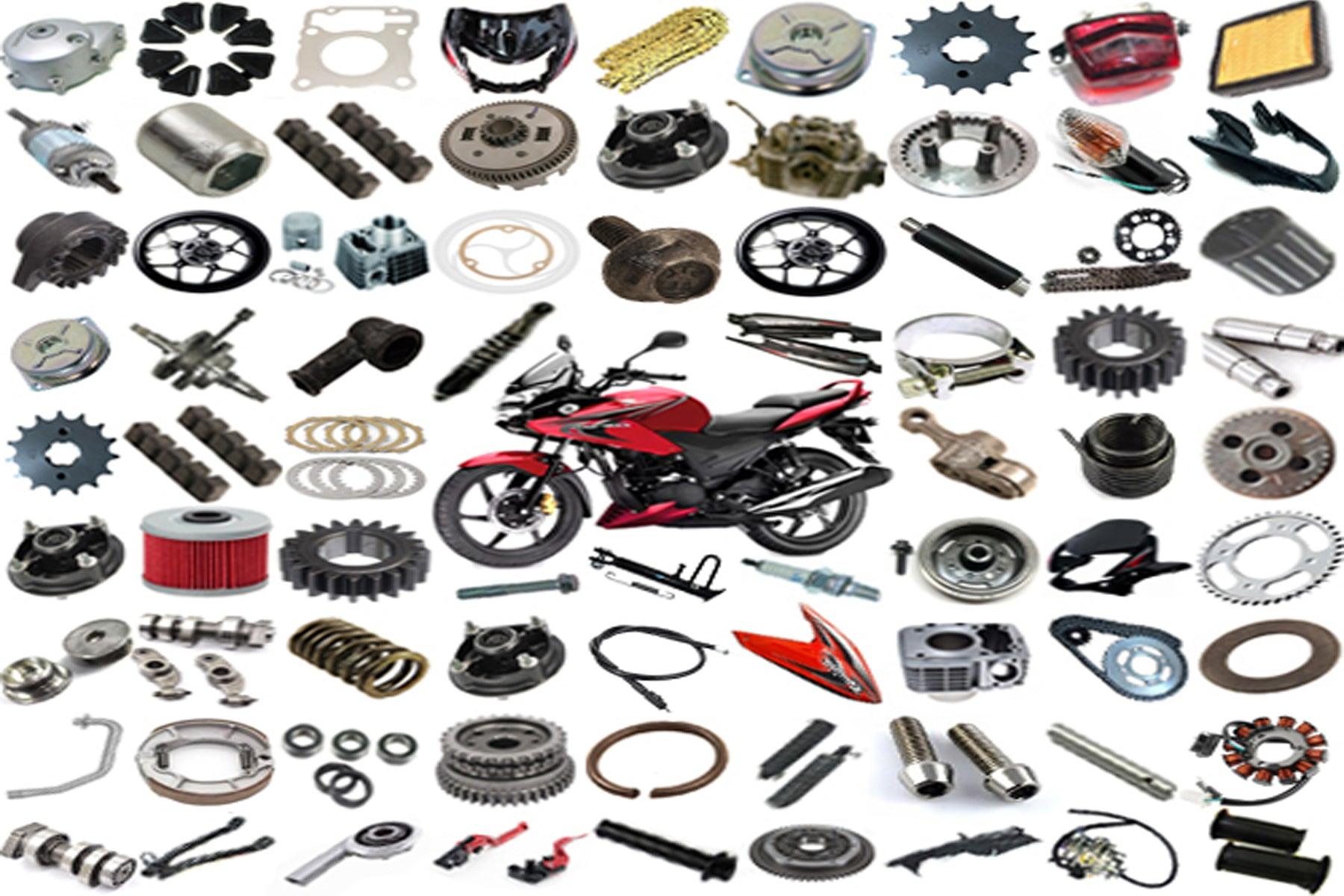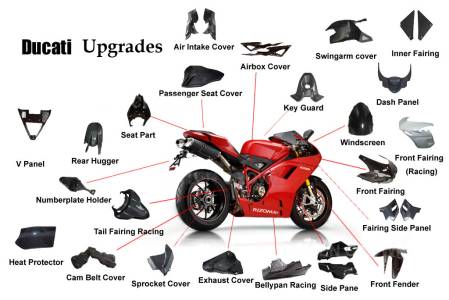Discover the Important Motorcycle Parts You Required for Optimum Performance
Comprehending the vital parts of a bike is essential for achieving peak performance. Each element, from the engine to the stopping system, plays an essential duty in general capability and safety. Routine upkeep can protect against unexpected failures and improve the riding experience. However, numerous bikers forget the details of these systems. Uncovering exactly how they collaborate can bring about a much more effective trip. What vital elements should every biker prioritize?
The Engine: The Heart of Your Bike
The engine acts as the core element of a motorbike, driving its efficiency and defining its capacities. It is in charge of converting fuel right into power, which powers the bike onward. Numerous sorts of engines are used, including single-cylinder, V-twin, and inline arrangements, each offering distinct characteristics suited for various riding functions and styles. The engine size, normally gauged in cubic centimeters (cc), substantially influences performance, with bigger engines normally offering even more power and torque.Furthermore, the engine's layout and technology, such as gas injection systems or air-cooling versus liquid-cooling, impact effectiveness and reliability. Maintenance is vital for peak procedure; aspects like regular oil changes and monitoring ignition system warranty long life. Bikers typically think about an engine's responsiveness and level of smoothness, as these attributes boost the overall riding experience. Eventually, the engine continues to be an essential aspect that specifies not just the bike's efficiency yet also the cyclist's connection to the maker.
The Transmission: Shifting Gears Smoothly
The transmission plays a vital role in a motorcycle's performance, specifically in the auto mechanics of equipment moving. Understanding how to shift equipments smoothly can improve the total riding experience, while routine maintenance guarantees peak capability. Proper attention to these facets can considerably impact the longevity and effectiveness of the bike.

Equipment Shifting Mechanics
Smooth equipment changing is vital for ideal motorbike efficiency, considerably impacting both velocity and control. The mechanics of gear changing entail the communication in between the clutch, gear bar, and transmission system. When a rider engages the clutch, it disengages the engine from the transmission, permitting for a gear change without damaging the elements. A well-timed release of the clutch, combined with exact activity of the equipment bar, assists in a seamless modification between equipments. This procedure guarantees that the engine runs within its best power band, enhancing efficiency. Oem Parts New Zealand. Furthermore, comprehending the gear ratios and their impact on rate and torque can assist bikers make educated options during shifts, inevitably contributing to an extra delightful and responsive riding experience
Upkeep Tips Relevance
Regular maintenance plays an essential role in assuring that the transmission system runs efficiently, permitting smooth gear changes. On a regular basis transforming the transmission and checking liquid is essential, as old fluid can cause enhanced rubbing and wear. Additionally, inspecting the clutch for wear guarantees peak interaction and disengagement, preventing slippage during equipment adjustments. Lubrication of relocating components is just as crucial to decrease rubbing and boost efficiency. Bike owners ought to likewise monitor for leakages and unusual noises, as these can suggest underlying issues. By sticking to these maintenance suggestions, bikers can lengthen the lifespan of their transmission system, assuring that gear changes stay seamless and adding to the total performance of their motorbike.
The Braking System: Ensuring Security on Every Ride
Braking systems are fundamental elements that straight affect a motorcycle's safety and security and efficiency. They include numerous components, including brake pads, blades, calipers, and hydraulic lines, all collaborating to guarantee efficient deceleration. The type of stopping system-- normally either disc or drum-- impacts responsiveness and quiting power.Regular maintenance is crucial to copyright peak efficiency; used brake pads can cause reduced performance and raised quiting distances. Additionally, the quality of brake liquid must be checked, as it can absorb wetness with time, jeopardizing stopping efficiency.Riders need to likewise think about the value of anti-lock braking systems (ABS), which avoid wheel lockup during abrupt stops, improving total security. Appropriately functioning brakes are not simply about stopping; they instill confidence in the rider, permitting safer navigation with numerous terrains. Eventually, a reliable stopping system is essential for appreciating every adventure with peace of mind.
The Suspension: Enhancing Convenience and Control
A well-functioning shock absorber substantially adds to a motorcycle's general performance, enhancing the effectiveness of the braking system. The suspension plays a substantial duty in soaking up shocks from unequal surfaces, assuring a smoother ride while keeping tire contact with the road. This get in touch with is vital for both security and control, enabling cyclists to browse corners with self-confidence and precision.Different kinds of shock absorber, such as telescopic forks or mono-shocks, use differing degrees of comfort and handling. Properly tuned suspension improves responsiveness, giving the rider with an extra linked feeling to the motorbike. Normal maintenance checks are vital to ascertain the suspension parts, including dampers and springs, are functioning at their ideal. An effective suspension system not only raises the riding experience yet also adds to the durability of other motorbike components by minimizing deterioration. Because of this, investing in quality suspension is vital for any severe motorbike fanatic.
The Tires: Connecting You to the Roadway
Tires play a necessary function in a motorcycle's efficiency, acting as the key link in between the road and the motorcyclist. Understanding the different kinds of tires readily available can considerably impact dealing with and safety. In addition, normal upkeep is important to guarantee peak tire efficiency and long life.
Tire Keys In Explained
Just how do various tire kinds affect a motorbike's efficiency? Tire types play an important function in establishing a motorcycle's stability, grip, and handling. Sporting activity tires, designed for high efficiency, deal improved grip and responsiveness on smooth roads, making them excellent for racing and hostile riding. On the other hand, visiting tires focus on longevity and convenience, providing a smoother trip for long-distance traveling. Off-road tires, characterized by their rugged walk patterns, excel in grip on unpaved surface areas, appropriate for experience lovers. Additionally, dual-sport tires blend features from both off-road and on-road categories, dealing with versatile riding demands. Ultimately, see this here selecting the best tire kind is important for optimizing performance, guaranteeing safety and security, and boosting the general riding experience.
Maintenance Tips Offered
While riding on the road, preserving excellent tire condition is essential for safety and efficiency. Frequently inspecting tire stress is very important, as under-inflated tires can cause bad handling and boosted wear. It is advisable to evaluate tread deepness regularly; used tires compromise hold and security. On top of that, riders should look for signs of damages, such as splits or lumps, which can suggest the need for replacement. Turning tires periodically assures also wear, improving durability. Keeping tires tidy from particles and preventing too much visuals can lengthen their life-span. Ultimately, preserving appropriate positioning and balance adds to peak performance, reducing stress on other bike elements. Complying with these maintenance ideas will greatly enhance the general riding experience.
The Gas System: Sustaining Performance and Effectiveness
The fuel system plays an essential function in taking full advantage of a motorbike's performance and efficiency, as it ensures the optimum distribution of gas to the engine. It makes up several important parts, consisting of the gas container, fuel pump, fuel filter, and fuel injectors or carburetor. Each part has to function effectively to assure a smooth and powerful ride.The fuel tank stores gas and supplies it to the engine by means of the gas pump, which generates the essential pressure. A fuel filter protects against contaminants from entering the engine, while the injectors or carburetor mix fuel with air for combustion.Proper maintenance of the gas system is vital; a clogged up filter or malfunctioning injector can bring about decreased performance and raised fuel consumption. By verifying that the fuel system operates efficiently, bikers can take pleasure in better throttle action, better fuel economy, and on the whole browse around these guys improved riding experience.
The Electrical System: Powering Your Ride
An efficient electrical system is important for the general performance and safety of a motorbike, as it powers essential components such as the ignition, illumination, and different electronic systems. This system consists of the battery, which shops energy, and the alternator, in charge of generating power while the engine runs. The circuitry harness links these parts, making certain reputable power distribution.Additionally, fuses safeguard the system from overloads, while relays help control high-current gadgets with low-power signals. A well-kept electric system improves efficiency by making sure smooth begins and constant operation of lights and signals, vital for cyclist exposure and safety.Regular checks of the battery's cost and links are essential for preventing electrical failings. Riders need to additionally examine wiring for damage, ensuring all components work preferably. Eventually, a durable electrical system adds helpful hints considerably to the total efficiency and reliability of the motorbike.
Often Asked Concerns
How Usually Should I Change My Motorcycle's Battery?
The frequency of bike battery replacement depends on usage and upkeep (Oem Parts New Zealand). Normally, batteries should be replaced every three to five years. Normal checks can assist identify when a replacement is needed for peak performance
What Tools Do I Need for Standard Motorcycle Upkeep?
For standard bike maintenance, one requires important tools such as an outlet set, wrenches, screwdrivers, pliers, tire stress gauge, and a torque wrench. These tools promote reliable upkeep and ensure the motorbike runs effectively and safely.
Exactly How Can I Improve My Bike's Aerodynamics?
To boost bike the rules of aerodynamics, one need to think about adjusting fairings, utilizing windscreen extensions, maximizing body setting, and decreasing overall weight. These alterations help reduce drag, boosting stability and fuel efficiency throughout adventures.
What Are the Signs of a Failing Electrical System?
Signs of a falling short electrical system consist of dimming lights, problem beginning, uneven instrument readings, and blown integrates. Motorbike Components NZ. Unusual scents or corrosion around battery terminals may also show underlying problems needing immediate focus for security and efficiency

How Do I Select the Right Oil for My Bike?
When picking oil for a motorcycle, one must take into consideration the maker's requirements, viscosity rankings, and the kind of riding. In addition, synthetic versus standard oil can affect efficiency and engine protection, affecting the decision considerably. The engine size, typically gauged in cubic centimeters (cc), significantly influences efficiency, with larger engines generally giving more power and torque.Furthermore, the engine's style and technology, such as gas injection systems or air-cooling versus liquid-cooling, influence performance and reliability. A well-functioning suspension system significantly contributes to a motorbike's total performance, complementing the effectiveness of the braking system. The gas system plays a crucial function in making the most of a motorcycle's efficiency and performance, as it ensures the ideal delivery of fuel to the engine. A gas filter prevents impurities from getting in the engine, while the injectors or carburetor mix fuel with air for combustion.Proper maintenance of the fuel system is essential; a blocked filter or malfunctioning injector can lead to decreased efficiency and boosted fuel intake. A well-kept electric system boosts efficiency by making certain smooth starts and constant procedure of lights and signals, crucial for motorcyclist visibility and safety.Regular checks of the battery's cost and connections are important for avoiding electrical failures.
Comments on “Expert Tips on Maintaining Durable Bike Parts Wellington”